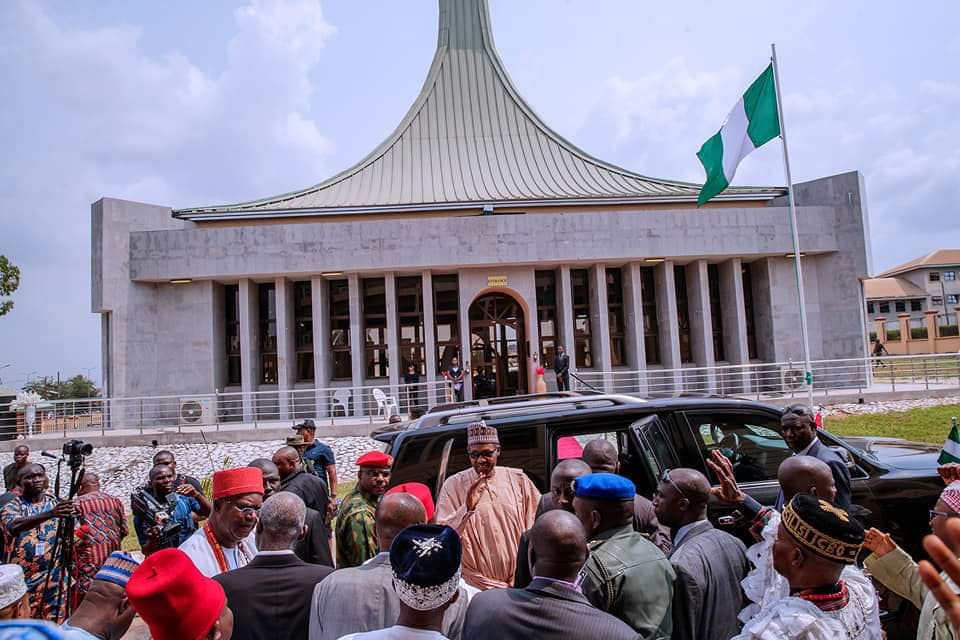WRITTEN BY TIMOTHY IFEDIORANMA
To the glory of God, the twenty-three-year old Zik’s mausoleum has been inaugurated at last. The gigantic project, situated at the heart of Onitsha, the commercial nerve centre of Anambra state, nay Nigeria and the resting place of the great Zik, is in memory of the doyen, political juggernaut and giant of Africa, the late Chief Dr Nnamdi Benjamin Azikiwe, Owelle of Onitsha.
The two-storey Zik’ mausoleum with provisions for two conference halls, museum, archive, video, research, library and documents centre was started by the Federal Government in 1997 during the late General Sani Abacha’s regime. Dr. Azikiwe, a foremost Nigerian nationalist, died on May 11, 1996 and was buried at the Inosi Onira, Onitsha, now Zik’s Mausoleum. He was 92 years old. For many years, the mausoleum was abandoned and it was over-grown with weeds and rodents. However, it took the Buhari administration less than three years to complete the about one point five billion naira project.
The speedy execution and completion of the project by the President Mohammadu Buhari regime is commendable. Irrespective of political affiliations, the President deserves applause. In the same vein, Governor Willie Obiano deserves commendation too.
Apart from his repeated inspection visits to the site and continuous appeal to the federal government, realists are of the opinion that the cordial relationship existing between the Obiano administration and the federal government is the magic fillip that brought about the completion and subsequent inauguration, which will provide jobs to our teeming youth.
Akpokuedike repeatedly emphasized that the legacy of Zik of Africa need to be sustained in order to promote patriotism, peace and unity of Nigeria, as well as the spirit of genuine service to humanity among the citizenry.
Obiano even asked the President to declare November 16, Zik’s birthday, as National Day, just as the United States has done to its heroes like Martin Luther King, who fought racism in all its ramifications in the sixties. The governor even revealed that Anambra would soon start to observe November 16 of every year a work-free day in the state to commemorate the birthday of Zik.
No doubt, Zik, as the greatest detribalised leader among his contemporaries, deserves even more than that. Owelle of Onitsha is the greatest Nigerian who has lived in the last few centuries; a Nigerian who inspired the likes of former Ghanaian President, Kwame Nkrumah, whom he supported to go to the United States to study in order to have a better understanding of the black and African condition. African nations like Ghana and Tanzania have long honoured their pan Africanist leaders like Nkrumah and Julius Nyerere.
Ghanaians celebrate the Founder’s Day on September 14 in honour of Nkrumah’s birthday, while Tanzanians mark the Nyerere Day on October 4 in commemoration of his death. It is therefore odd for Nigeria to continue to fail to honour Dr Azikiwe on an appropriate scale. This will continue to prick our individual and collective consciences until the right thing is done.
No doubt, Zik also inspired such Nigerian nationalists as Chief Obafemi Awolowo with his intelligence, eloquence and public oratorical skills as well as literary gift. Chief Awolowo felt so challenged that he had to go to England to study law, even as a married man. In appreciation of Zik’s profound influence on him, Awo, also known as the sage among his admirers, established his Tribune newspapers on Zik’s birthday, as Awo himself revealed in a 1980 letter.
Dr. Nnamdi Azikiwe was the most detribalised Nigerian politician who spoke all three main Nigerian languages, gave his children names of other ethnic groups and named key institutions for leaders of different ethnic groups, including his opponents. When Zik established the University of Nigeria at Nsukka in 1960, he named its halls and residences after Sir Ahmadu Bello, who was then the Premier of Northern Region; Chief Samuel Akintola, who was the Western Premier and Chief Awolowo, who was Leader of the Opposition in Parliament.
Above all, Zik’s bold and imaginative development strides resulted in the country’s rapid development. Zik’s establishment of the University of Nigeria, Nsukka, caused the Western Region to establish the University of Ife and the Northern Region to set up Ahmadu University
at Zaria. Zik’s establishment of the African Continental Bank (ACB), Nigeria’s first indigenous bank, led to the Western government’s building of the National Bank and the Northern Region’s building of the Bank of the North. Zik was truly phenomenal.
While Ndi Anambra and indeed Ndigbo are commending the government for according Zik his final resting peace, they will not, like Oliver Twist, hesitate to ask for more. The Federal Secretariat being constructed in Awka and the second Niger Bridge should be hastened, while the federal roads in Igboland should be reconstructed as they are now death traps.
Equity equally demands appointing Ndigbo into sensitive positions in government, no matter the political linen, because what is good to the goose is equally good to the gander.





Comments are closed for this post.